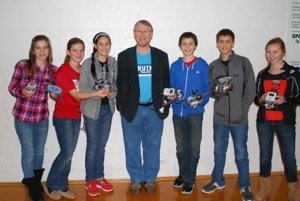
Collaboration Through Robotics
Essential 21st Century Job Skill
Article Header
« Return to Main PageCollaboration Through Robotics
Essential 21st Century Job Skill
We often hear about "21st century job skills" - things people should know in order to be best prepared for jobs today. This phrase recently caught my attention "Collaboration is not a 21st Century Skill, it is a 21st Century Essential." Collaboration, what is it?
- the action of working together to produce or create something
- to work jointly with others or together especially in an intellectual endeavor
Part of the idea is that "two heads are better than one." I enjoyed reading the book The Wright Way. It presented a great historic example of collaboration. The Wright Brothers, created one of the greatest "could never be done" inventions of the 20th century - heavier than air flight. This book talks about a collaboration technique they often used to help conquer engineering barriers - forging. Sort of like arguing or fighting with ideas and concepts. It reminds me of the concept in Proverbs "Iron sharpens iron." The idea that two working together can improve each other. So how does one teach kids this essential 21st century skill? I believe I have found something which works very well - teaching them how to build robots together. They not only get exposed to another essential skill for today's shrinking job market - robots and digital technologies, but they learn how to work together as a team to create something. A couple of weeks ago I had the privilege of spending a week at a high school in PA, teaching a 10-hour workshop to junior high and high school students on robotics. Here is a brief highlight of what it looked like. I believe this provides a great model for other high schools to follow in providing their students with these 21st century job skill essentials.
- used the Lego Mindstorm robotics kits - huge part of the success because kids love legos and they idea of bringing your lego creation "to life" is very engaging and motivating
- students worked in teams of 3 to learn how to build and program a robot - then they were given the opportunity to assimilate this knowledge by designing and building a robot of their very own - this demanded teamwork and collaboration
- we started by doing a basic mobile robot building
- then, we learn about sensors and how to add them to the robot so it can engage with the world around it
- a good bit of time is spent on programming concepts - how to speak to a computer/robot, language & communication concepts, instructions, looping/repetition, decision making, memory/variables, multitasking, and, of course, debugging - figuring out why it does not work right and finding a solution
- creative flexibility - learning that you might not always have exactly the right lego pieces, so adapting and adjusting your build plan
- problem solving and learning how to work together to solve these problems is one of the biggest benefits of the workshop
- considering the biblical concept of being made in the image of God and how that impacts their desire and ability to create - comparing that to God's ability to create from nothing, recognizing the limits of humanity - also, challenging them on the importance of formulating a biblical worldview on technology; what does the Bible say about technology - good and bad
- discuss the value of knowing how to build computer software - what that looks like, as well as, the rapidly growing demand for it in a world which is becoming increasingly dependent upon software
- discuss how robots and software can help us make sense out of the tera bytes and peta bytes of data that "being digital" is allow us to capture
- at the end of the week, they learned how to teach others also by presenting their robots to different elementary classes - this helps them work on the valuable skill of communication and being able to take something complex and explain it in simple, understandable terms
I really like what this school does to facilitate this type of collaborative learning experience. Each year they set aside the first week of 2nd semester, they call it J-Term, and offer all sorts of practical, hands-on learning sessions. The sessions meet for 2 hours a day; the students take 3 different course. In 10 hours of class time, I believe this workshop exposed them to some essential 21st century job skills as well as challenged them to develop a biblical worldview on technology. Of course, my final challenge was to encourage them to consider the role of a biblical worldview, liberal arts based, higher education to help properly prepare them for life. My #1 pick is BJU and particularly the computer science program, where I invested 30 years of my life helping Christian young people learn how to think critically and interface with computers to solve real world problems for the glory of their Creator and Savior, Jesus Christ!






















